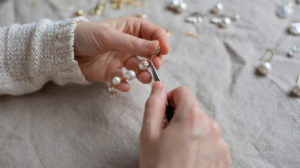Time-Out


"P
latform Nine and Three-Quarters?”
A street musician with dreadlocks banged on a set of drums in the corner of the train station. I pressed my hands over my ears trying to block out the noise as I gaped first at the wall looming ahead and then at the woman next to it.
I’d first met her two hours earlier that evening when she’d intercepted me wandering the neighborhood trying to clear my head after a particularly bad blowout with my mother.
“You’re overreacting!” Ima had yelled. “Those pastries were on special! I’m not forcing you into any decisions! Shuli calm down! Okay okay stop crying mammele see I’m putting these nice cakes right into the freezer no need for a l’chayim this week — well it would be good actually with Leah’le and Moishe still here from Chicago… Shulamis Esther Levine calm down! No that is not pressure! I’m being pragmatic! You can’t schlep forever…”
I hadn’t believed Rochela Kokosh at first as the middle-aged woman explained her shidduch program in a slight British accent. She was dressed all in black except for the green ribbon tied around her sheitel and matching green eyeglass frames. Time-Out Zone she’d called it for singles needing a break from shidduchim.
Two hours later I found myself at the train station gripping a small carry-on and garment bag.
“Okay remind me again how this works ” I said nervously. “I go on this break thingy and time stands still? How’d you even know about me? And no shidduch decisions? For how long?”
“Forget the time factor dear.” She ignored the middle part of my question. “Time doesn’t move. It’s not a break it’s a brake. With an ‘A.’ A time brake. The concept is derived from quantum mechanics — haven’t you heard of the quantum Zeno effect?”
“Um I’m not a science person.” A time brake. A place to escape decisions escape my bed piled high with clothing escape the reality of what to do about—
Okay don’t laugh but mentally I refer to him as “The Boy” — somehow that’s easier for me to deal with — or on occasion “the J-Man.”
“Quite simple once we worked out how to adjust the speed of light ” Mrs. Kokosh added. She pointed ahead of us. “Shall we?”
I stared dubiously at the wall stationed between Platform 9 and Platform 10 in Grand Central Station noticing the grandfather clock built in. Nine o’clock it read.
“Platform Nine and Three-Quarters?” I repeated. “You’re kidding me right?”
“Our techie was a Harry Potter fan ” Mrs. Kokosh explained. “You’re familiar with it surely? Simply hold onto your luggage and walk straight through — I promise it works.” She gestured again toward the wall. “Are you ready? Well then don’t pickle a pickle dear.” She gave me a firm push and the musician stopped drumming for a split second to flash me a peace sign. “Don’t think just go.”
So I did.
When I emerged on the other side, I noticed two things: First, the grounds were gorgeous. Second, other than Mrs. Kokosh, I was the only female there.
“Oh, dear, we’re in the men’s division,” Mrs. Kokosh said hastily. A bearded fellow in a trench coat rushed past. “We’ve been having some signal trouble — need to get that fixed — pardon me. We’ll walk, it’s barely half a mile.”
I nodded, surveying the lush grass, miniature lake, and row of cabins. On a nearby tennis court, a swarm of boys were jumping around, arms thrashing wildly, and Mrs. Kokosh followed my gaze.
“Oh, kazatzka exercise! It’s mandatory, 20 minutes daily — our long-term boarders develop muscle atrophy otherwise. We do it at our division, too.”
“Okay…” I glanced around. “A lot of people here.”
Mrs. Kokosh nodded. “Plus a waiting list.”
A waiting list? For boys? I started giggling.
“They have it worse, I sometimes think,” she said, and I sobered quickly. “The applications keep rolling in. Bein hazmanim, we call it. We just built a second dormitory, and we still kick them out after a week. Except the ones here on Starwoods points.” Pointing to a small building on the right surrounded by beautiful gardens, she continued, “That’s our non-shidduch division, for people needing brakes from dealing with other problems — health, parnassah, children.” She pointed to another grassy area further away. “And that’s where our cabins are.”
She explained more about the Zone as we hiked toward our division. “First, no cell phones,” she said. “Time is frozen, so you won’t be getting calls or texts—”
I love this place already.
"H
i, I’m Gila!” chirped a girl who looked no more than 15. Mrs. Kokosh had dropped me off in front of my cabin and disappeared. “I’m your roommate? You’re Shuli?” She looked at me eagerly, red curls flowing down her back, green eyes expectant. “The top bunk is yours but I can switch if you want? I saved the right half of the closet for your stuff? How many Shabbos outfits did you bring?”
She couldn’t have been more than 18. What was she doing here?
“Thanks,” I told her abruptly. “Gonna need time to unpack. Alone. If you don’t mind.”
“Oh! Okay! For sure!” She fingered her hair. “I was about to head to supper, anyway? Save you a seat?”
I dumped my suitcase near the shelves, noting her haphazard stash of shirts, jewelry, a brightly colored belt, curling iron, and— wait, please don’t tell me that’s a selfie stick?
“Sure,” I said, and as she turned away, I rolled my eyes.
T
ime-out.
A shidduch brake.
This. Is. Exactly what I need…
Eyes closed, I sank into the beach chair and stretched my legs on the deck table, welcoming the golden rays of early morning sunlight on my face. I took another slurp of coffee — I drink it black — and felt my woozy early morning brain cells clicking into place. I’d skipped dinner, heading to bed early. This morning, I’d left Gila snoring lightly as I quietly dressed and snuck outside into the mountain air.
The smell of waffles and real maple syrup — do you gain weight here? I need to ask Mrs. Kokosh — wafted from the dining area. Somewhere in a parallel universe, people buried their heads in pillows to avoid the stress and decisions heralded by yet another day, while I luxuriated in the Zone to the sound of crickets and an occasional splash in the pond.
“Hey.” The crunch of gravel a few feet away forced my eyes open. A tall girl approached, panting slightly. “I’m Chayala. Just did my morning walk — gorgeous here — another early riser? You’re new, right? Hold, let me get water first.”
She left to the kitchen. By the time she reappeared, another three girls had wandered out, followed by Gila.
“Okay, introductions first, then kazatzka!” Chayala announced, and one by one, I learned about my fellow Time-Out Zoners.
“Was almost engaged and I’m not talking about it.” This from Dafna, age 30, an acerbic-looking blonde who managed to look great in a black slinky skirt and velour hoodie. “But I’m here. Possibly forever.”
“Zero dates in 18 months,” Chana, age 29. “But nineteen e-mails! Nineteen random people my mother made me e-mail my r?sum? to, not to mention the kevarim I’ve visited. And I’m batting a zero… Maybe because I am a zero…”
“Here since the day before my birthday.” Miriam, age 19-plus-ten, as she’d called it. “My 30th birthday, two years ago in real-time. Kokosh tried kicking me out but I’ve got squatter’s rights. I can get you my lawyer if you need.”
Then it was Gila’s turn.
“I’m Gila?” she said, smiling hopefully. She was the only one with a full face of makeup. “I’m back from seminary. My parents, grandparents, they’re all scared, I have one older sister, she was 23 when she finally got married.” Dafna’s thin eyebrows shot up. “Everyone’s stressed, I’m stressed, so… I needed a brake. And once I’m here, maybe I can pick up some shidduch advice!”
How did Kokosh allow this?
“Dump him fast, before he dumps you,” Dafna retorted. “That’s my advice. And if he starts talking engagement, get that statement notarized—”
“You next,” Chayala interrupted, pointing at me.
“And maybe hide his passport.” Dafna folded her arms and nodded at me grimly.
“Uh, Shuli Levine.” I stopped abruptly, looking around me. I never yenta-talk shidduch specifics. But five expectant faces stared back. “I’m in the middle of… whatever. Going out, I guess. The shadchan, my parents, the boy, everyone’s ready… I don’t know. Whatever. I needed a brake. With an ‘A.’ ”
“How old are you?” Gila asked. I told her, and her jaw dropped. “Thirty-one? I think you should just marry him.”
I stiffened. “And I think you and your stupid seminary issues should get kicked out—”
“Hey, chillax,” interrupted Chayala. “So what’s his name? The boy?” She waggled her eyebrows. “Sorry, ich bin massive yenta.”
“That’s classified information.”
“Absolutely.” She grinned.
I sighed. “I call him the J-Man,” I admitted, “and I’m not saying anything else.”
“I’m also in the middle of a parshah, but doesn’t sound as advanced as yours.”
“How many times?”
“Five.”
“Get over yourself,” Dafna interjected. “Five dates does not a parshah make. In my opinion.” She sipped her coffee. “A pasuk, maybe. Perek, max.”
“Well, technically, I’m in the middle of Date Six now—”
“You’re in the middle? By in the middle, you mean—”
“He’s still at the Waldorf.” Chayala looked sheepish. “I timed-out.”
Dafna choked, spewing coffee all over her sweater.
“You ditched him mid-date?” Gila shrieked, above Dafna’s hacking coughs, then covered her mouth quickly. “Sorry, sorry. You are completely, totally entitled.”
Chayala shrugged. “Time stopped, didn’t it? And — whatever. I needed to think things over.”
“What happened?” I waggled my eyebrows back at her; my turn to be yentish. “C’mon, tell Tante Shuli e-v-e-r-y-t-h-i-n-g!”
Chayala propped her feet on the deck table. “Well, it’s kinda complicated.”
I waved my arm expansively. “We’ve got all the time in the world.”
“Can I pass?” Chayala’s smile didn’t quite reach her eyes. “Bottom line, I took a Time-Out.”
Chana sighed. “Didn’t we all. Okay, kazatzka!”
“Nu, Shuli?” Chayala asked, as we started our warm-up. “Any more details about your J-Man issues? Just between friends.” She winked.
“That’s classified information,” I said primly.
T
he next two days passed blissfully.
I awoke to the sound of birds chirping, luxuriated in early morning walks — I’d adopted Chayala’s habit — and met the group after Shacharis for a kazatzka workout, followed by breakfast; the Zone kitchen had a machine that made these amazing ice-blended cappuccinos. Savta Simcha, as Chayala had dubbed Mrs. Kokosh, stayed away, which was a relief; I’d suspected she’d try date-coaching us back to reality. She wore black every day, color-coordinating her fluorescent ribbons and eyeglass frames. Rumors flew over her identity. According to Dafna, her husband was an MIT-trained astrophysicist who coached the men’s division — they were awed that I accidentally ended up there (“Did you see anyone normal?” Chana wanted to know) — while Miriam claimed she was a Chabad shluchah.
I managed to keep Gila at bay, except for one incident where she’d called me hysterically from the bathroom to kill a cockroach that “wasn’t becoming dead.” I found her crouched under the sink, brandishing a shoe and a hairspray container she kept spritzing toward the scurrying cockroach. I crashed my own slipper down, but when I lifted it, the cockroach scuttled out… We finally managed to sweep it out the cabin window with a broomstick, screeching in unison.
“So I mentioned the cockroach story to Savta Simcha,” I told the group that evening while setting up a campfire barbecue. My ponytail still stuck straight up due to Gila’s Pro-V Ultimate Hold, which I’d gotten when I stepped into her line of fire. “I knew I’d killed it, I heard the crunch — and it just walked off! And she’s like, ‘Oh, of course you wouldn’t have been able to kill the cockroach, it’s not really here, just a superposition into our Hilbert space. Haven’t you heard of string theory?’ ”
T
our hours later, around the campfire, the marshmallows were long gone. Mrs. Kokosh had retired for the night. And instead of ghost stories, we were relating our shidduch ones.
“Okay, so I just finished describing how he blew his top at the parking attendant, and the dating coach tells me, ‘Well, don’t be hasty, you’re 29, maybe he’s a lamed- vavnik—’
“So I’m like, maybe instead of circling a fourth time, let’s just find a parking lot — and remember, this is the same guy who came the first date on Access-a-Ride and told me to tell the driver my name was Zbigniew Matislavitskiy — but he’s like, no, no, keep saying kapitel kuf-lamed and we’ll try again…”
Dafna sniffed. “You call that crazy? I went out with a guy, we spent 40 minutes circling for parking and finally he ended up yanking out a hydrant with his bare hands.” She fixed a pointed look at Gila, who listened, openmouthed. “And this is why you bring a credit card on dates. You don’t want to end up like the Prince of Nigeria, getting strangers to wire money over e-mail so you get home safely.”
Credit card? With her track record — Dafna’s wacky experiences, in her words, averaged a nine on the shidduch Richter scale — she should carry a change of clothing, oil refill, trail mix, crazy glue, and a first-aid kit. And pepper spray. I imagined Dafna clickety-clacketing across the Ritz lobby in heels, balancing the world’s largest wristlet on her arm.
Or a wheelie. I bet she schlepped a little wheelie on dates.
“The other person, he had no problems parking.” Dafna’s voice, when she spoke again, was so low I had to strain my ears to hear.
“Which other— oh.” Gila clamped her mouth shut as four pairs of eyes wordlessly glared at her. “Oh. Sorry.”
And then Dafna started to cry.
Frozen, we watched her rise and stumble toward the bungalow area. From afar, Mrs. Kokosh’s cabin light flickered on and a shadow emerged. The campfire crackled, its embers sending up a whispered tail of smoke, then died out, submerging us in darkness.
No one moved.
Gila was the first to get up and say she was bunking for the night — she looked ghostly pale, actually — and the rest of us disbanded soon after.
Dafna’s tears left me in a sour mood as I followed Gila into our cabin. My roommate shouldn’t be here. Seriously, an 18-year-old schnook-face when there were real issues to deal with? I turned on her as she exited the bathroom.
“Honestly,” I said. “What are you doing here?”
She stared at me, wide-eyed, and didn’t answer. Her hands were shaking.
“You’re 18. Don’t you have shadchanim to meet? CLEP tests to study for? Shidduch selfies to shoot?”
No response.
“Are you okay?” She didn’t answer, and my heart dropped in my chest. Something was wrong. “Gila! Talk to me! Should I call for help?”
“No!” Her words were slightly slurred. “There’s — in my drawer, the middle one, on the side, wrapped in aluminum…”
I rushed, panicked, to the dresser and found a small, foil-encased package in the middle drawer. Understanding slowly dawned as she unwrapped what looked like a gel tube, broke off the cap, and fingers trembling, squirted its contents in her mouth.
“You’re diabetic.”
“Don’t tell anyone!” Her eyes were panicked, even more than before. “My parents will kill me. Nobody knows. I’m not allowed to tell people. Please, Shuli, don’t tell anyone—”
And Gila’s story slowly unraveled.
At age 14, she’d collapsed one morning and was rushed to the emergency room. I listened as she revealed how her parents sat her down, in the hospital still, instructing her on “the rules.” How she was forced to keep her diagnosis a secret from everyone — friends, teachers, everyone. “You’ll thank us later,” her mother had told her, but her high school years had been miserable.
Now, entering shidduchim four years later, Gila was terrified.
And what could I tell her? Everything would be okay? That wasn’t necessarily true, and we both knew it.
“I know in my brain it’s bashert, all this shidduch stuff.” Gila looked at me. “Everyone says that all the time. Right?”
I nodded slowly.
“And I’m frum, so I believe that, too, right?”
I paused.
Gila was still looking at me.
I swallowed. “Right.”
She rested her head in her arms for a moment, then looked up. For one instant, our eyes met.
“Shuli, tell that to me in words a heart can understand,” she whispered brokenly, and I felt something inside me shatter.
And suddenly, I was furious. Furious at Gila’s parents for making their daughter — their cute, freckled, slightly goofy daughter — feel like a second-class citizen. Furious at a system where this girl was a second-class citizen, furious at a society that relished, in an obscene sort of way, the melodrama of the “singles crisis,” that created Miriams, that fed the panic of parents terrified of navigating that system with their less-than-perfect child.
“You listen to me, Gila, and listen up good.” My voice shook with anger. “You’re cute, you’re funny, you’re nice, you’re smart. Diabetes doesn’t change who you are, do you hear me? All those people — don’t you dare listen to them.” I drew in a shaky breath, plunging ahead. “They’re idiots, all of them! Society is one bumbling, massive idiot. Remember that, do you hear me? I’m not speaking against your parents, maybe they did what they felt was needed, but society is an idiot. Repeat that after me! Society is—”
“An idiot.” She said it in a half-whisper.
“Say it louder!”
“Society is an idiot!” She was smiling, a little shakily.
“Good for you. Exactly.” I let out a breath. “You remember that. You’re not an idiot, and the boy you’re going to marry isn’t an idiot. Individuals, generally, are mostly non-idiots. So you’re safe.”
She nodded slowly.
“And you need to move on, okay? I’m not saying to start going out tomorrow — you want to take a year, two years, school or whatever, fine. But move! You don’t belong here, Gila. You really, truly don’t. Move on. Honest, it’s not so bad out there. Don’t listen to Dafna, to any of us — stay away from Miriam. It’s… it’s good. It’s okay. If you’re meant to be married at 20, that’s great. But if not — whenever it happens, you’re good. And it’s not because of your diabetes or anything else. I don’t have diabetes, okay, plus I was chesed head and G.O. president, and I’m here, too. It happens when it’s supposed to and whenever that is, you’re good. There’s so much — there’s life hidden in those years too.”
The tenseness in her shoulders noticeably eased. “I need to check my blood sugar now,” she said. “I went low before. Um, you mind if I do it in front of you? It’s not gross, just a finger-stick.”
I realized, as I climbed into bed later, two things. One, that my little speech was true; I couldn’t imagine what my life would’ve been like without these extra years. I wasn’t a 21-plus-ten. I was 31, and each of those years meant something, and in retrospect, I don’t think I would have planned it any differently.
After all this time, my heart — in Gila’s words — finally understood.
And two, there was no way I could have said this without the knowledge of J-Man waiting in the background.
You don’t belong here. You really, truly don’t.
I pushed that thought aside.
T
he trail curved ahead of me, dew filtering through my walking shoes as I brisk-walked the windy path in the woods the next morning. My mind wandered to Gila. A part of me felt like sitting on the floor and weeping for the painful experiences she was bound to face in upcoming years… But she’d figure it out. Somehow, we all did. I gave a wry grin. She’d probably surprise us all and get engaged to the first boy she met.
Everybody’s got their shidduch backstory, I realized, as a squirrel scampered across the trail. I also realized I loathed the phrase “older singles.” The universal term lumped us together, undermining the uniqueness of each one’s experience. I had friends back home — one confided she hadn’t even wanted to get married until age 28, another could barely get a date because of a brother who’d gone off the derech. There was Gila — well, technically she wasn’t “older” — and her medical issues, Dafna and her almost-engagement…
“Hey, Shuli!”
…and Chayala, frozen in Time-Out Zone for whatever reason she had.
I waved. “How’s it going?”
Then I noticed the suitcase at her feet.
“I’m on my way outta here, I guess.”
“You’re serious? Wow.” I hugged her. “That’s great!”
“Whatever. Wish me luck.” She paused, opened her mouth, shook her head, then closed it. She opened her mouth again. “Whatever. Shuli… What about you?”
You don’t belong here. You really, truly don’t.
“Goodbye, Chayala.”
“Sorry.” With a wave, she was off.
“All’s well that ends well, right?” Gila asked brightly, approaching from behind. “You think they’ll get engaged?”
I shrugged. “Who knows. Why are you up so early?”
“Um. I went to speak with Savta Simcha just now….”
I raised my eyebrows, comprehension dawning in a mix of surprise, pride, and a niggle of something else I couldn’t quite identify.
“Yup. I’m leaving.” She smiled. “Help me pack?”
I forced a grin, and that’s when I recognized the emotion that had flitted its tiny wings.
It was envy.
A
nd then there were four.
The dining area felt too quiet that night. Dafna and Chana were engrossed in conversation and it seemed rude to interrupt; Miriam was busy playing Candy Crush on her phone and didn’t need company, either. I headed to my cabin but felt unsettled there, too, with Gila packed out. I wondered how she was doing. Funny, how she landed in Time-Out because she was scared of starting shidduchim, while I ended up here—
I shook my head. Time-out. I’m not thinking about this.
I perched on the top bunk bed, feet dangling down, arms propped behind me. Gazed aimlessly at the ceiling. Tried to suppress the feelings of emptiness cascading down in thick waves.
You don’t belong here. You really, truly don’t.
I exhaled slowly.
There is nothing more painful in shidduchim than the angst of making a decision.
I remember my friend once describing her shidduch parshiyos like a plane taking off. “Sometimes it’s my brain in the pilot seat, ready for takeoff, and sometimes it’s the heart,” she’d explained philosophically one night, as we were polishing off licorice bites in the front seat of her car. “But never both. The other organ, it’s not even checked into the shidduch airport.”
I hadn’t understood back then. “I have no planes, even,” I’d said mournfully, and we’d both laughed like maniacs until tears streamed down.
I got her now, though. The brain says one thing, the heart says the opposite. And vice versa, and usually the brain is announcing multiple things at once and the heart is torn in different directions within itself, too. And those two forces — the heart and the mind — squeeze together, chafing against each other so painfully… But it’s at that interface where human experience resides, making decisions, navigating those opposing forces to propel your life forward, forward, forward.
Which would mean, I guess, that in this place — Time-Out Zone — I’m not really living.
You don’t belong here. You really, truly don’t.
I sighed.
It was fear keeping us all here, I realized, climbing down from the bunk bed and rummaging for a flashlight; the grounds in the Zone were pitch-black by nightfall. Chayala’s fear of whatever it was; Gila’s fear of a process that rejected her before she even started. Dafna’s fear of heading back into shidduchim and getting burned again. Kamikaze dating, I heard her call it once. And me…
I stepped out of the cabin, breathing in a rush of crisp night air, and trekked across the grass. Me. Fear of… I don’t know. Fear of change, maybe. Moving on. Despite the many years in shidduchim — or maybe because of them — fear of the next step. I absently climbed over a tree stump. Fear of allowing myself to finally dream of an engagement, after years of keeping that door barricaded tightly shut because simply giving up was less heartrending than the emotional seesaw of hope and letdown. Fear of making a decision.
It wasn’t even so much a mind-heart conflict, if I were truly honest with myself. Most parts of my brain were there ages ago; the heart caught up some dates later, and everything just needed time to marinate in the same spot before moving on.
Don’t pickle a pickle, I heard Kokosh’s voice say, and I started to smile.
Ahead of me, a garden light illuminated a small set of bungalows, and I ran the last few meters toward Mrs. Kokosh’s cabin…
…And nearly crashed into a silhouette that had just staggered out.
Wait. Was that—
“Chayala?” Uh-oh. “Chayala! Why are you… what happened?”
She looked at me.
“I’m back, is what happened,” she said flatly, and slammed the cabin door shut.
I
wanted to stay on, but Mrs. Kokosh refused.
“Once you decide to leave, you’re out,” she stated. Her hairband was bright pink this time. “Something happens after and you need another brake, we’ll negotiate. Pack your bags, dear! We’re leaving in 40 minutes.”
I didn’t have a chance to speak with Chayala by the time I found myself wheeling my suitcase down the dark gravel path, Mrs. Kokosh alongside me holding my garment bag and a flashlight. I’d call the shadchan when I returned home. Maybe we could still arrange a date for tomorrow — I needed something to wear, I wondered if the cakes were actually frozen. What was tomorrow? Friday? Monday?
I guess I’d find out.
“He’s a good person?” Mrs. Kokosh suddenly asked, abrupt. “Your Mister J?”
“J-Man,” I corrected, nodding. He was nicer than I was, actually.
“You like him?”
“That’s classified information.”
Her mouth twitched, but she didn’t say anything.
“How’d you know to come get me, the other day?” I asked suddenly. “You never told me.”
A small smile played on her lips. “Let’s just say we received an insider tip from a certain young man…”
My mouth formed a round O.
“You think it’s easy for a 36-year-old man in shidduchim? He was a VIP. For years. He sponsored the slow cooker for the morning cholent, and the past two months, he was here almost daily. He gave a morning shiur for the men — very chashuv, your J-Man. Last week he made a siyum on Maseches Eiruvin, I think it was?” She paused. “He’s allergic to mushrooms, by the way.”
I stared at her, speechless.
“But…” I sputtered. “But— we were going out! When did he—”
Mrs. Kokosh adjusted her pink eyeglasses. “Well. Haven’t you heard of the Turing Paradox?”
I felt a giggle bubble inside me and quickly suppressed it.
“He said he’d come back to give out chassan cigars. Just so you know.”
From afar, I heard the incessant pounding of drums, the train platform gradually becoming larger as we drew closer into the area. Mrs. Kokosh handed me my garment bag, waving her other arm.
“And here we are. Platform Nine and Three-Quarters.”
She pressed some buttons on her flip phone, and the grandfather clock embedded in the platform wall chimed. She put an arm around my shoulder, and her voice softened. “Don’t think, Shuli, just go. Go.”
I nodded, a lump forming in my throat as I tightened my grip on my luggage. “Help Chayala along.” The words popped out before I could help it.
“It’s her third time here.” Mrs. Kokosh hesitated. “It’s complicated — she’s got that shidduch fortress up — but never mind her, let me deal with that.” She leaned closer and hugged me. “Mazel tov to you, for when it’s official.” She gave me a half-smile. “You and your J-Man.”
I opened my mouth to protest. Then closed it.
And I nodded again.
(Originally featured in Family First Issue 539)
Oops! We could not locate your form.












